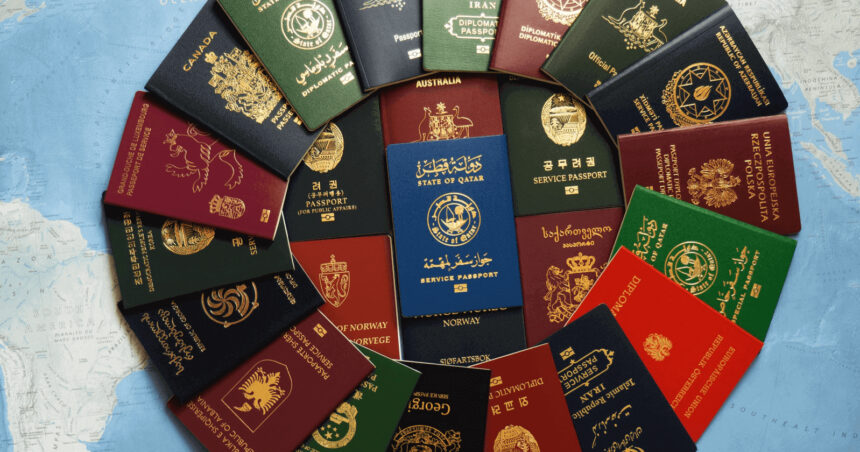In today’s interconnected world, where globalization and travel play a pivotal role in economic and cultural exchanges, the importance of a passport transcends its practical function. It is a tool of international diplomacy, a measure of national influence, and a symbol of freedom and mobility. The power of a passport is ranked based on the number of countries it allows visa-free or visa-on-arrival access to, and in 2024, the top 10 most powerful passports are dominated by countries that have forged strong diplomatic relationships, economic partnerships, and global alliances. This blog will explore the factors behind the strength of these passports and provide an in-depth look into the countries that hold the top spots.
Understanding Passport Power
The value of a passport is determined by several factors, including the visa-free or visa-on-arrival access it provides to various countries, the ease of travel it facilitates, and the reputation of the country it represents. The number of countries a passport allows its holders to enter without a visa, or with a visa upon arrival, significantly impacts its global ranking. A strong passport not only provides its citizens with more travel freedom but also reflects the country’s global standing, political stability, economic strength, and diplomatic relations.
The Henley Passport Index, which ranks passports based on the number of destinations their holders can access without a prior visa, is a well-known benchmark in the field. For 2024, the following 10 passports hold the top spots in the world.
1. Japan: (193 Countries)

Japan has consistently held the top spot in global passport rankings, and 2024 is no exception. Japanese citizens enjoy visa-free or visa-on-arrival access to an impressive 193 countries, which places their passport as the most powerful in the world. This extensive travel freedom is a testament to Japan’s robust diplomatic relationships, its role as a leader in global economics, and its strong reputation as a peaceful, progressive nation.
Japan’s ability to maintain amicable relationships with countries worldwide has allowed its citizens to benefit from agreements that ease travel restrictions. In addition to its global reach, Japan’s passport is also a reflection of the country’s low risk for illegal immigration, high security, and its citizens’ respect for international laws and regulations.
Key Advantages:
- Visa-free access to almost all of Europe, North America, and Asia.
- Visa-on-arrival agreements in several countries in Africa and the Middle East.
- Strong economic, diplomatic, and cultural influence on a global scale.
Japan’s top-ranking passport represents the nation’s leadership in technology, trade, and innovation. Additionally, Japan’s role in fostering peaceful international relations through humanitarian efforts and its focus on global collaboration solidify its top position.
2. Singapore: (192 Countries)

Coming in at a close second, Singapore’s passport grants its citizens access to 192 countries. Singapore has built its international reputation as a global business hub, excelling in finance, trade, and innovation. As one of the world’s most developed and secure countries, Singapore is seen as a trusted partner by many nations. This is reflected in the ease with which Singaporean citizens can travel globally.
Singapore’s geographic location in Southeast Asia positions it as a key player in connecting the East and West. Its passport benefits from its strategic partnerships with both regional neighbors and global powers like the U.S., China, and the European Union. The country’s strict laws and stable governance further enhance its global standing, ensuring that Singaporean passport holders are seen as reliable travelers.
Key Advantages:
- Widespread visa-free access in Europe, North America, and Asia.
- Close economic ties with powerful nations like China and the U.S.
- Reputation for political stability and security, boosting global trust.
Singapore’s blend of economic dynamism and diplomatic expertise is reflected in its passport’s global ranking, allowing its citizens to traverse much of the world with ease.
3. Germany: (191 Countries)

Germany ranks third in 2024, with its citizens enjoying visa-free or visa-on-arrival access to 191 countries. As the largest economy in Europe and a key member of the European Union, Germany’s passport reflects its geopolitical significance and strong international relations. Germany has a long history of diplomacy, trade, and leadership, both in Europe and globally.
German passport holders can travel freely across the Schengen Area, and the country’s passport is seen as one of the most reliable, granting entry into many regions without stringent visa requirements. Germany’s commitment to humanitarian efforts, its contributions to global peace initiatives, and its involvement in international trade make its passport one of the most powerful.
Key Advantages:
- Schengen visa benefits allow free travel across Europe.
- Strong diplomatic ties with North America, Asia, and Africa.
- Global leadership in humanitarian and environmental efforts.
Germany’s passport power is further boosted by its reputation for efficiency, security, and adherence to international law, qualities that other countries seek in potential visa-free travel partners.
4. South Korea: (190 Countries)

South Korea’s passport has climbed the ranks over recent years, placing fourth in 2024. South Korean passport holders can travel visa-free or obtain a visa on arrival in 190 countries, making it one of the most powerful passports in Asia. South Korea’s rapid rise to global prominence, thanks to its booming economy, technological advancements, and global cultural influence, has led to stronger diplomatic relationships and visa agreements.
The “Korean Wave” (Hallyu), characterized by the global popularity of K-pop, Korean films, and television dramas, has played a key role in increasing South Korea’s visibility on the world stage. In addition to its cultural impact, South Korea’s economic partnerships with major powers like the U.S., China, and the EU, as well as its involvement in international organizations, have enhanced its passport’s strength.
Key Advantages:
- Extensive visa-free access to North America, Europe, and Asia.
- Strong cultural influence, boosting international recognition and goodwill.
- Technological leadership and robust economic partnerships.
South Korea’s passport reflects its growing importance as a global cultural and economic player, with its citizens benefiting from increased mobility around the world.
5. Finland: (189 Countries)

Finland’s passport is ranked fifth in the world, providing its citizens with visa-free or visa-on-arrival access to 189 countries. Known for its high quality of life, progressive values, and leadership in education and environmental policy, Finland is highly regarded by other nations. Its role within the European Union, coupled with its diplomatic neutrality, ensures that Finnish passport holders can travel widely with few restrictions.
Finland’s foreign policy is centered on cooperation, peacekeeping, and sustainability, further enhancing the global standing of its passport. Its participation in global climate change initiatives and its reputation for governance excellence make Finland a valuable partner in international diplomacy.
Key Advantages:
- Access to the Schengen Area and the broader European Union.
- Reputation for diplomacy, neutrality, and peacekeeping.
- Strong social welfare system and environmental leadership.
Finnish citizens benefit from their country’s well-earned global respect, allowing them to explore most regions without the hassle of complex visa processes.
6. Italy: (189 Countries)

Italy’s passport ranks sixth, with visa-free or visa-on-arrival access to 189 countries. Italy, with its rich history, influential culture, and economic contributions, is a prominent global player. The Italian passport allows its citizens to freely travel across Europe and provides easy access to a wide range of countries in the Americas, Africa, and Asia.
Italy’s status as a founding member of the European Union and its leadership in various global institutions contribute to its high passport ranking. The country’s diplomatic outreach, especially through cultural exchanges and tourism, further enhances the strength of the Italian passport.
Key Advantages:
- Schengen visa benefits for travel within Europe.
- Rich cultural history contributing to positive international relations.
- Strong economic and trade partnerships around the world.
Italian passport holders enjoy access to global opportunities, driven by their country’s long-standing influence in areas such as fashion, design, and the arts.
7. Spain:(189 Countries)

Spain ties with Italy in the sixth spot, offering visa-free or visa-on-arrival access to 189 countries. As a major European Union member, Spain benefits from its strong political and economic ties with Europe, Latin America, and other regions. Spanish citizens have access to a wide array of visa-free travel options, especially across Latin America due to shared language and historical connections.
Spain’s contributions to global culture, its role in EU diplomacy, and its influence in areas such as tourism and renewable energy have made its passport highly desirable. Spain’s ability to maintain strong relations with countries in different continents enhances its citizens’ travel freedom.
Key Advantages:
- Schengen zone access and EU benefits.
- Strong ties with Latin American countries.
- Cultural influence and international tourism industry.
Spain’s historical significance, combined with its modern-day global outreach, makes its passport one of the strongest in the world.
8. Luxembourg: (188 Countries)

Luxembourg, a small but highly influential country in Europe, ranks eighth, offering its citizens visa-free or visa-on-arrival access to 188 countries. Luxembourg’s passport is a reflection of its political stability, economic prosperity, and central role in the European Union. As one of the wealthiest nations in Europe, Luxembourg has built strong international relationships that benefit its passport holders.
Luxembourg’s position as a financial hub and its active role in EU institutions contribute to its passport’s strength. The country’s high standard of living, coupled with its stable and effective governance, enhances its global reputation.
Key Advantages:
- European Union membership providing extensive travel benefits.
- Economic stability and financial influence.
- Strong international diplomatic and trade relationships.
Luxembourg’s passport provides its citizens with excellent travel freedom, driven by the country’s economic and political influence.
9. Denmark: (188 Countries)

Denmark’s passport ranks ninth in 2024, offering visa-free or visa-on-arrival access to 188 countries. Denmark is known for its high quality of life, strong social welfare systems, and progressive policies. As a member of the European Union and the Schengen Area, Danish passport holders benefit from broad travel access within Europe and beyond.
Denmark’s reputation for innovation, environmental sustainability, and political stability enhances its global standing. The country’s commitment to international cooperation and human rights also contributes to the strength of its passport.
Key Advantages:
- Schengen and EU membership benefits.
- High quality of life and social stability.
- Leadership in environmental and technological advancements.
Danish citizens enjoy the benefits of a strong passport, supported by their country’s positive international reputation.
10. Sweden: (188 Countries)

Rounding out the top 10, Sweden’s passport provides visa-free or visa-on-arrival access to 188 countries. Sweden is renowned for its neutrality, human rights advocacy, and high standard of living. As a member of the European Union and the Schengen Area, Swedish passport holders can travel extensively across Europe and other regions.
Sweden’s commitment to global issues such as climate change, social justice, and innovation further bolsters its passport’s strength. The country’s reputation as a progressive and peaceful nation makes its passport highly valued on the global stage.
Key Advantages:
- Extensive EU and Schengen Area access.
- Strong reputation for human rights and environmental sustainability.
- Influence in global social and technological advancements.
Sweden’s passport reflects its positive international image, offering its citizens extensive travel opportunities.
The Impact of Powerful Passports on Global Mobility
The strength of a passport affects more than just the ease of travel; it reflects the country’s global influence and diplomatic relationships. A powerful passport can provide significant advantages, including:
- Enhanced Travel Freedom: Citizens of countries with powerful passports enjoy greater flexibility in their travel plans, reducing the need for visas and facilitating smoother international movement.
- Economic Opportunities: A strong passport often correlates with a country’s economic stability and global influence, which can open doors for business, employment, and educational opportunities abroad.
- Diplomatic Leverage: Countries with strong passports typically have robust diplomatic relationships, which can lead to favorable trade agreements, international collaborations, and enhanced global standing.
- Cultural Exchange: Easier travel facilitates cultural exchanges and global interactions, allowing citizens to engage more deeply with other cultures and fostering international understanding.
Future Trends and Considerations
As the global landscape continues to evolve, passport power rankings may shift due to several factors:
- Geopolitical Changes: Shifts in global alliances, conflicts, and diplomatic relations can impact visa agreements and affect passport rankings.
- Economic Developments: Economic growth or downturns can influence a country’s ability to secure favorable visa agreements and maintain its passport’s strength.
- Technological Advancements: Innovations in technology, such as biometric passports and digital travel documents, may change the way passport strength is assessed and impact travel freedom.
- Global Health and Security Issues: Pandemics, security concerns, and international health policies can affect travel restrictions and influence passport rankings.
Conclusion
In 2024, the power of a passport is a reflection of a country’s global influence, diplomatic relations, and economic strength. The top 10 most powerful passports offer their holders unparalleled access to the world, showcasing the achievements and international standing of these nations. From Japan’s leading position to Sweden’s impressive ranking, these passports symbolize the freedom and opportunities available to their citizens. As the world continues to change, the strength of these passports will likely evolve, driven by geopolitical, economic, and technological factors.





